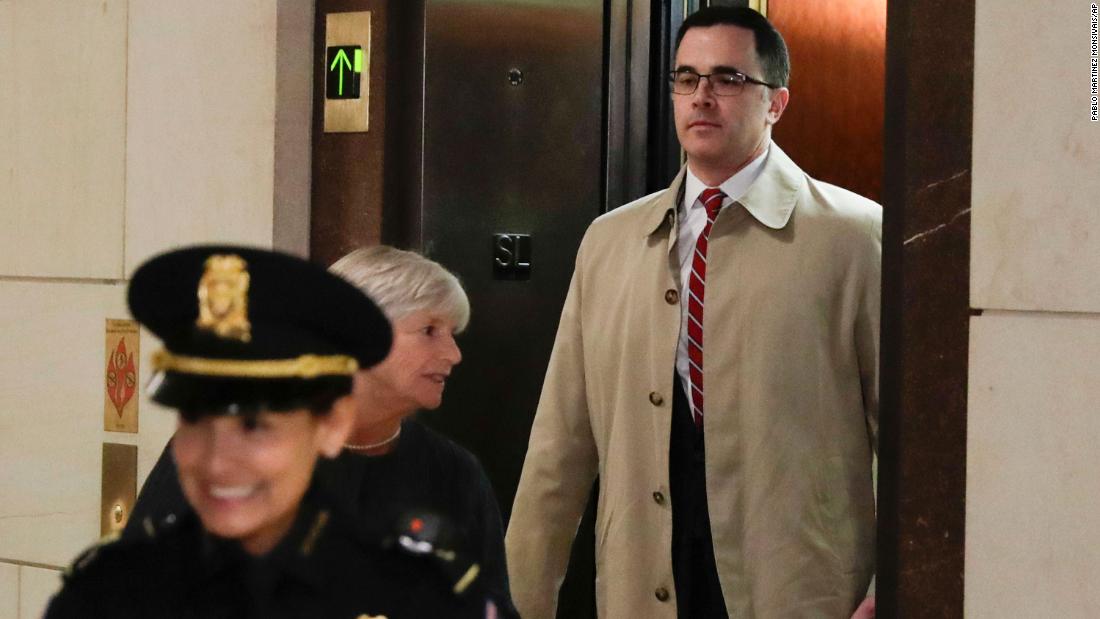[ad_1]
“I want to be clear, I was not concerned that anything illegal was discussed,” Morrison said, according to his opening statement.
Morrison, whose appearance on Capitol Hill lasted for more than eight hours, backed up last week’s testimony from Taylor, currently the top US diplomat in Ukraine, about interactions the two had regarding the President’s efforts to press for investigations while US aid to Ukraine was held up. While he did deviate from Taylor on some details, Morrison testified that Sondland told him the President would release the aid if the Ukrainian prosecutor general announced an investigation, according to sources.
“I reviewed the statement Ambassador Taylor provided this inquiry on October 22, 2019. I can confirm that the substance of his statement, as it relates to conversations he and I had, is accurate,” Morrison said.
Morrison did not raise any concerns about the call to the National Security Council lawyers, as Vindman did, according to one source. And Morrison described the rough transcript released by the White House as a “fair representation” of the tone and content of the call, the source said.
Morrison’s concerns, sources said, were over the prospect that the call transcript would leak. He was concerned about how the leaked transcript would play out in a “polarized environment” in Washington, how it would impact bipartisan support for Ukraine in Congress and how it would impact Ukraine’s perception of the US.
But Republicans emerged from the deposition saying Morrison’s testimony undercuts the Democrats’ argument that the President committed impeachable offenses.
“Mr. Morrison’s testimony was very damaging to the Democrats’ narrative,” said Rep. Mark Meadows, a North Carolina Republican, suggesting that his testimony contradicts other witnesses.
“Some of the other witnesses have been less than candid,” Meadows said.
A senior White House official said the White House view is that Morrison’s testimony is good for Trump because he said he thought the rough transcript of the July call was fair and accurate and he didn’t think there was anything wrong with it legally.
The House Intelligence, Foreign Affairs and Oversight committees appear to be nearing an end to the closed-door depositions phase of their impeachment inquiry, and Thursday’s resolution laid out rules for the Intelligence panel prepares to soon hold public hearings. The committees have scheduled a week’s worth of depositions with Trump administration officials next week, when Congress is out of session, but it’s not clear how many will attend.
The biggest potential witness looming is former national security adviser John Bolton, who is scheduled to appear next Thursday. His attorney said Wednesday that he would not attend voluntarily and needed a subpoena, but House Intelligence Chairman Adam Schiff declined to say Thursday if he planned to issue one.
One difference Morrison had from Taylor’s account was when Taylor testified that Morrison had relayed to him that Trump told Sondland he wanted Zelensky to “go to a microphone” and announce an investigation into the Bidens and the 2016 election.
But in describing his conversation with Taylor, Morrison said that Sondland indicated it would have been sufficient for Trump if the Ukrainian prosecutor general announced the investigations he sought, according to one source.
Another detail that Morrison said was different was the location of an interaction, sources said.
At times, Morrison’s attorney has instructed his client not to answer questions about interactions with the President, multiple sources said.
Rep. Debbie Wasserman Schultz, a Democrat from Florida, told CNN that Morrison’s attorney got into a “tussle” with House Intelligence Committee lawyers about what questions he could answer. She said they would likely return to those questions later.
“I just think the witness today had some difficulty in answering certain questions,” Wasserman Schultz said.
Prior to the testimony, Barbara Van Gelder, Morrison’s lawyer, told CNN that privilege issues are fact specific, and they will be handled in accordance with the House rules if they come up during the deposition.
This story has been updated with additional developments Thursday.
[ad_2]
Source link




